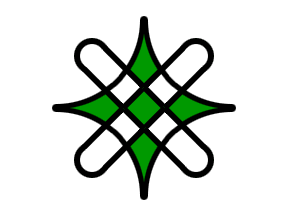![[Northern Nigeria 1966]](../images/n/ng-rng.gif) image by Ivan
Sache, 04 March 2001
image by Ivan
Sache, 04 March 2001
FOTW beschäftigt sich mit der Wissenschaft der Vexillologie (Flaggenkunde).
Alle auf dieser Website dargebotenen Abbildungen dienen ausschließlich der Informationsvermittlung im Sinne der Flaggenkunde.
Wir distanziert uns ausdrücklich von allen hierauf dargestellten Symbolen verfassungsfeindlicher Organisationen.
Last modified: 2016-03-25 by bruce berry
Keywords: nigeria | yoruba | star: 7 points | head | striped flag | hausa |
Links: FOTW homepage |
search |
disclaimer and copyright |
write us |
mirrors
See also:
The Hausas are the dominant ethnic group in the north of Nigeria (40-45% of
the population of the country), with Kano as their capital. In 1966, after an aborted
coup, the federal system was to be abolished. The north reacted violently
because this abolishment was interpreted as a means to establish domination by
the south (especially the Ibos). This movement, followed by tribal and political
violence, led to the secession of Biafra. So the
Hausa
flag might have been used during one of the several military rebellions which
occurred in the north during1966 (Source: Encyclopaedia Unversalis
[eunXX].
Ivan Sache, 12 Sept 1999
Hausa is a language group consisting of 10-15 million people primarily in
northern Nigeria and Niger.
Michael Smuda, 02 Mar 1999
![[Northern Nigeria 1966]](../images/n/ng-rng.gif) image by Ivan
Sache, 04 March 2001
image by Ivan
Sache, 04 March 2001
The flag of the proposed Hausa dominated state of 1966 as shown in Flags of Aspirant Peoples [eba94] consists of five horizontal stripes: red,
yellow, black, green, and light brown (shown above). Nations
Without States, however, describes the 1966 flag adopted by the Hausas as
having five horizontal stripes of red, yellow, indigo blue (instead of
black), green and khaki beige (shown below).
Ned Smith, 03 March 2001
![[Northern Nigeria, 1966]](../images/n/ng}hs.gif) image by Ivan
Sache, 03 March 2001
image by Ivan
Sache, 03 March 2001
This site
shows another flag used by the Hausa.
Gvido Petersens
This website is a tribute website with the biography of famous Brazilian footballer Pelé in eight languages, each identified with a flag: Brazil, for Brazilian Portuguese, Argentina for Argentine Spanish, Italy for Italian, Finland for Finnish, Indonesia for Indonesian, the Esperanto flag for Esperanto, and the U.S. flag] for American English. Hausa comes 4th in this list, between Italian and Finnish, and shows a squarish white flag with the “Northern Knot” symbol lined in black with some of its inner meshes filled in green.
 image by Antonio Martins, 07 Feb 2016
image by Antonio Martins, 07 Feb 2016
The “Northern Knot” symbol shows three interlocked (or merely superimposed)
loops, forming a 2-axis symmetrical design: One larger rhombus (45°-tilted
square) with concave curved sides, and two oblong “runtrack” shapes crossed at
90° on the center and filling the bigger shape’s concave quadrants.
 original
image by
John Beadle, 12 April 2000 and updated by Antonio Martins, 07 Feb 2016
original
image by
John Beadle, 12 April 2000 and updated by Antonio Martins, 07 Feb 2016
John Beadle quotes from the website of Today, a newspaper published in Abuja,
Nigeria, another version of the 'Hausa symbol' This time the version
of the emblem is in blue with a globe on it. It looks stretched, though,
possibly for effect. Its normalized look is shown below.
Antonio Martins, 07 Feb 2016
 image by Antonio Martins, 07 Feb 2016
image by Antonio Martins, 07 Feb 2016
The flag shown at this website is a "logo on a bedsheet" with the emblem of
the Hausas. That was official in a green flag (within a
white circle) and yellow cross fimbriated white from 12 December 1958 to 1963 as a
Northern Region flag, probably later adopted by the Hausa people (or at least
by an organization). The emblem is named "Northern Knot" and was used in the
Nigerian national flag for some months in 1963 (until October) and as the
Northern
Nigeria regional flag. After October 1963 only the national
Nigerian flag was
in use.
Jaume Ollé, 05 March 1999
 image by Antonio Martins, 07 Feb 2016
image by Antonio Martins, 07 Feb 2016
Jaume Ollé’s contribution links to Northern Nigeria but
on the timeline and flag designs shown thereon this is contradictory. Offering a
1:2 green-white triband with a "Northern Knot" symbol on it is as trivial as it is
conjectural.
Antonio Martins, 07 Feb 2016
Hosted by: Fanshop-Online.de und Handy-Shop.de
Tip: Handy mit Vodafone Vertrag